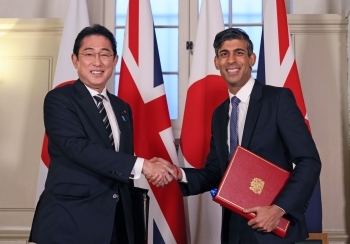According to the UK’s Office for National Statistics (ONS), the fall in GDP was due to a decline in all main sectors of the economy.
This is the “mildest recession” witnessed in 50 years — unlike the huge drop of over 1 percent sometimes seen, according to BBC.
The ONS said the real GDP fell 0.3 percent in the fourth quarter (Q4) of 2023.
The agency said hard-pressed households cut back on spending in response to soaring interest rates and rising living costs.
The UK GDP was estimated to have increased by 0.1 percent for the full year in 2023, following a growth of 4.3 percent in 2022.
According to ONS, this is the weakest annual change in real GDP since the financial crisis in 2009, excluding the year 2020, which was affected by the coronavirus (COVID-19) pandemic.
“The gross domestic product (GDP) is estimated to have fallen by 0.3% in Quarter 4 (Oct to Dec) 2023, following an unrevised fall of 0.1% in the previous quarter,” the UK statistics agency said.
“While the economy has now decreased for two consecutive quarters, across 2023, GDP is estimated to have increased by 0.1% compared with 2022.
“In output terms in Quarter 4 2023, there were falls in all three main sectors in the latest quarter with declines of 0.2% in services, 1.0% in production, and 1.3% in construction output.
“In expenditure terms, there was a fall in the volume of net trade, household spending and government consumption in Quarter 4 2023, partially offset by an increase in gross capital formation.”
Meanwhile, ONS had said the country’s inflation rate was 4.2 percent in January 2024 — the same rate as December 2023.
The rate was said to be a result of the fall in food prices which stood at 5.1 percent in the 12 months to January 2024, down from 5.2 percent in December 2023.
Also, the annual rate for the prices of goods slowed from 1.9 percent to 1.8 percent, while services annual rate rose from 6.0 percent to 6.1 percent.
Commenting on the report, Jeremy Hunt, chancellor of the exchequer, said high inflation is the single biggest barrier to growth which is “why halving it has been our top priority”.
“While interest rates are high – so the Bank of England can bring inflation down – low growth is not a surprise,” Hunt said.
“But there are signs the British economy is turning a corner; forecasters agree that growth will strengthen over the next few years, wages are rising faster than prices, mortgage rates are down and unemployment remains low.
“Although times are still tough for many families, we must stick to the plan – cutting taxes on work and business to build a stronger economy.”
Japan loses world’s third biggest economy to Germany
Meanwhile, UK’s Asian counterpart, Japan, the third largest economy, unexpectedly slipped into a recession.
According to a report submitted by Japan’s cabinet office on Thursday, the country’s GDP shrunk at an annual pace of 0.4 percent in Q4 last year.
The report showed both households and businesses cut spending for a third straight quarter.
All domestic demand was particularly weak, while external demand, which is captured by exports of goods and services, made a positive contribution.
Also, the Japanese Yen dropped to its lowest level against the United States dollar – the first time in more than 33 years.
The Yen tumbled 6.6 percent against the US dollar since the start of 2024.
The data confirms Japan’s economy as the fourth-largest in the world in dollar terms last year, as Germany now holds the world’s third-largest economy position.



